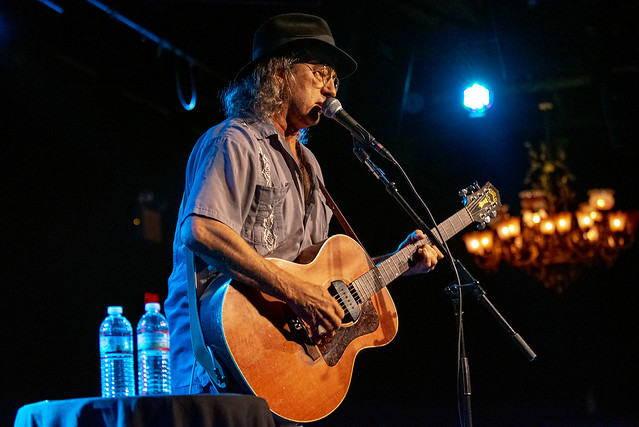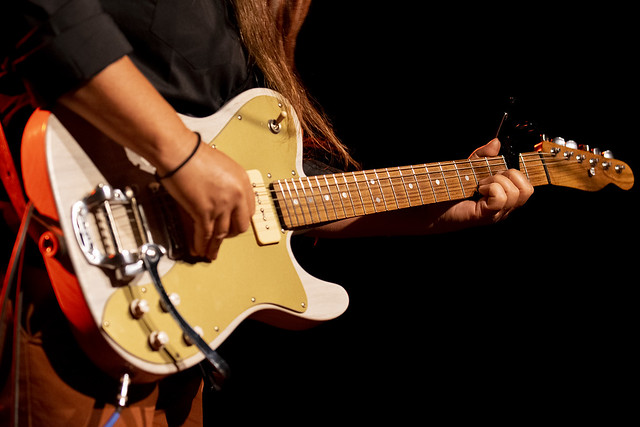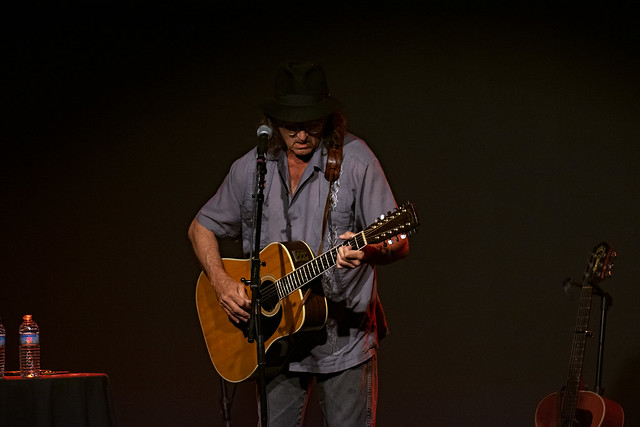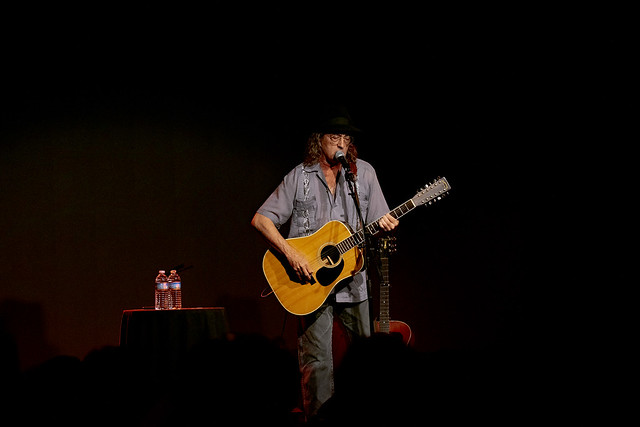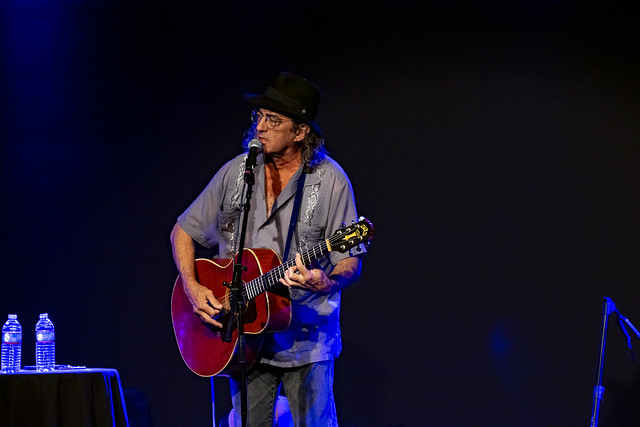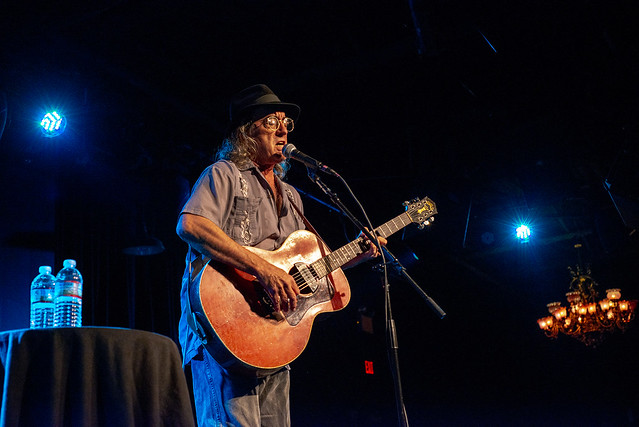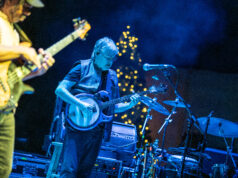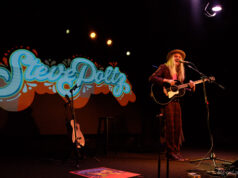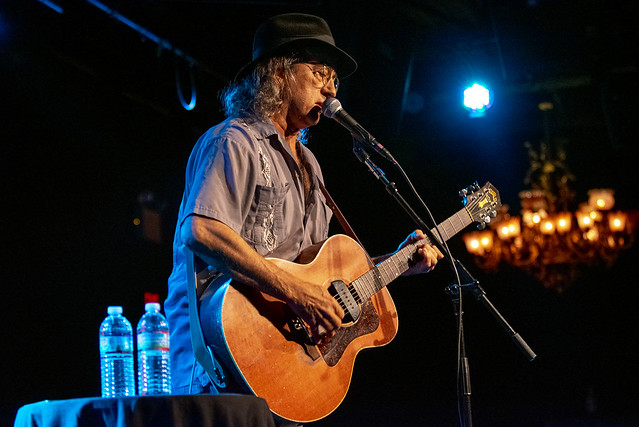
James McMurtry performs at The Birchmere on April 16, 2022. (Photo by Rashad Polk)
Popularity and respect are two entirely different things. Some artists — and I won’t name names here — are well known but may not be highly esteemed. Other artists command less name recognition, but, amongst those who are aware of them they are held in the highest regard.
James McMurtry is an artist who falls in the latter category: He’s far from a household name, but people who know James McMurtry think the world of him. Those people include his peers in the singer-songwriter community, like Jason Isbell, as well as literary figures like the bestselling author Stephen King and rock critics like Robert Christgau.
James has been making records since the ’80s, and his recent set at The Birchmere covered four decades of material.
James is the son of writer Larry McMurtry, who won the Pulitzer Prize for his novel Lonesome Dove and the Academy Award for his adaptation of the screenplay for Brokeback Mountain. Though he works in a different medium, there’s common ground: Both write stories that often involve the vistas of the American west, and they tell the stories of working-class people struggling to get by and make ends meet. In both men’s work, they manage to be literary while bringing things down to a beautiful simplicity that cuts to the bone. They empathize with their characters, who are often very different from themselves, to such a degree that one has to be careful to separate the voice in the work from the author’s own perspective.
James has emphasized that he doesn’t write autobiographical songs, though some of his peers and critics have suggested there’s more of him in his songs than he admits. Take, for instance, “Canola Fields,” a standout song from last year’s album, The Horses and the Hounds. He dryly joked about the album, “I heard it’s pretty good;” the consensus surrounding the album is that it is, indeed, a very good album. (While his output has been sporadic, with only three releases original material since 2008, they’ve all been superb.) James explained that he was crossing western Canada in November — you have to cross it because, as he pointed out there’s nowhere to stop there — when he learned that the crop being grown there was canola, and he was finally able to finish this song he’d been working on for a long time. In a killer line, he sings, “Cashing in on a 30 year crush, you can’t be young and do that.” This led some to observe that, while the song isn’t about him, it’s reflective of his own aging, as he enters his 60s.
On April 16 at The Birchmere, James opened with “Where’s Johnny,” the lead track from his second album, 1992’s Candyland, followed by the title track of Saint Mary of the Woods, which was released 10 years later, and another cut from that album, “Red Dress.” “Copper Canteen,” which appears on his 2015 album Complicated Game, “got me a feature in the magazine of the failing New York Times.” This is not a particular subtle dig at the “fake news” rantings of our former president, of whom James has been critical; his politics are, to put it succinctly, left of center, and he has not been shy about expressing his disdain for the last few right-leaning presidents.
Watch James McMurtry perform “Copper Canteen” live for Paste Studios in 2018 via YouTube:
While James has a fair amount of political material in his catalog, particularly the albums Childish Things and Just Us Kids, he mostly stayed away from it on Saturday. The only song from this period was “Hurricane Party,” which addresses the ravages of Katrina. Before he played “Hurricane Party,” someone in the audience shouted out a song they wanted to hear. James shut that down very quickly, saying, “Some of you know what you want to hear, but none of you know what you’re going to hear.” He emphasized that even he doesn’t know what he’s going to play until just before he plays it; one of the upsides of playing solo is that it allows the artist to improvise the setlist off the cuff.
Instead of his more political material, the set focused on his earlier material and on the more recent character studies of his last two albums. Some of the latter songs included “Jackie,” “You Got To Me,” “Decent Man,” and “Vaquero,” which includes lyrics in Spanish. Earlier material included “Levelland,” which he regularly plays and introduces as “one of the Robert Earl Keen songs I wrote.” He added that he’d just seen Robert Earl recently. Introducing “The Lights of Cheyenne,” he suggested that if you drive up to Baltimore, go around the loop, and go west for two days, you’ll go right through this song. A highlight of this set was the family epic “Choctaw Bingo,” which I especially appreciate for its nod to “some badass Hebrews.”
After “The Lights of Cheyenne,” the set rounded out with a few more songs. I’ve seen “If It Don’t Bleed,” another cut from the new album, described as the best song Warren Zevon never wrote. Introducing “State of the Union,” which was released only as a single, he told the audience, “nobody’s idea of reality matters to me when I’m writing a song.” He finished the set with an older song, “Peter Pan.”
Watch James McMurtry perform “Peter Pan” live during SXSW 2010 on YouTube:
The evening began with an opening set by instrumental guitarist Marisa Anderson, which was a very different flavor from the lyrically focused material performed by James. Explaining what she does, she said, “You may have noticed that I don’t sing. I think all songs are stories, whether they have words or not.” Introducing her composition “Cloud Corner,” she told the audience, “I don’t know why, but I do a lot of meteorological. This is a song about remembering to look up.” “18 to 1,” she explained, is “a song about beating the odds.”
Marisa releases material with some frequency; AllMusic shows three albums released between 2018 and 2021, though I’m not sure this captures all of her output. If I follow things correctly, the record she alluded to coming out this September is Traditional & Public Domain Songs. She told the audience, “One of the best things about doing traditional songs as a person who doesn’t sing is you can do whatever you want with them.” She went on to explain how “Streets of Laredo” is descended from a traditional Irish funerary song, and is “the only song where the cowboy apologizes.” Her version composites the two songs together, along with some additions of her own.
Marisa concluded her set with what she called her “happy song.” I’ve been a fan of her work since I discovered her through her collaboration with William Tyler, Lost Futures, and she did not disappoint in live performance. I’ll say this for James: He’s not afraid to bring someone out to introduce them to his audience, to show them some new, maybe different types of music they might not necessarily find on their own, and maybe even challenge them a little. This is of a piece with his determination that he’s going to his thing, that he’s not going to pander to his audience. A James McMurtry show is not a democracy, and that’s a good thing, because, frankly, an artist at his level knows how to do this better than any of us watching do.
Here are some photos of James McMurtry, along with a handful of Marisa Anderson, performing at The Birchmere on April 16, 2022. All photos copyright and courtesy of Rashad Polk.
